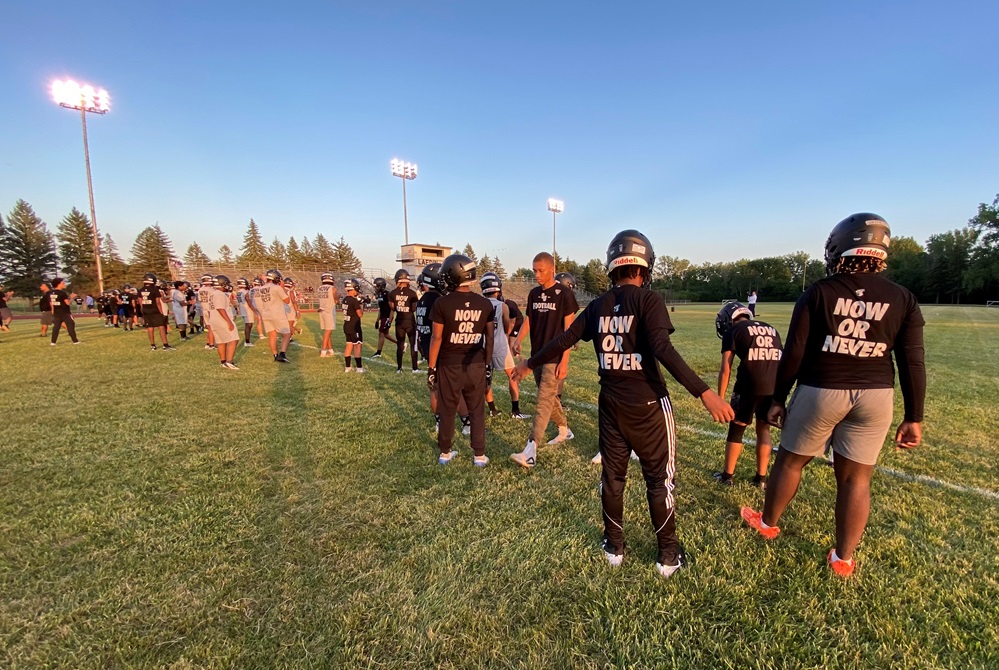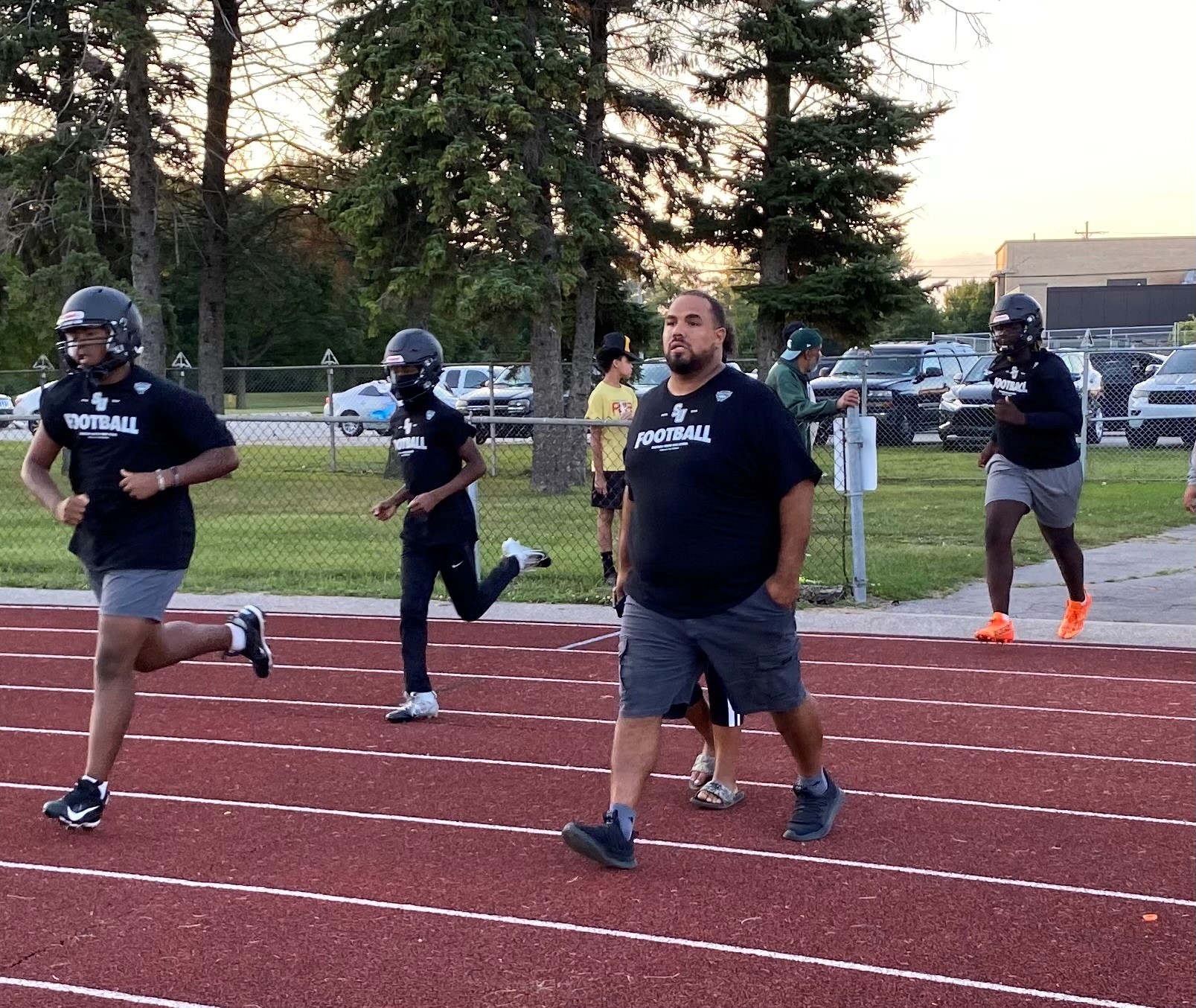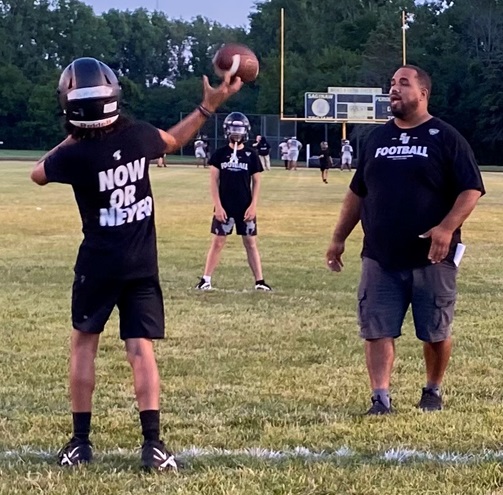
Talking Practice: Texas, Illinois Revise Policies
December 20, 2013
By Rob Kaminski
MHSAA benchmarks editor
Coaches and players in Texas and Illinois adapted to new football practice limitations this fall, with the Texas policy focusing on contact, and the Illinois regulation emphasizing length of preseason practices.
Following are the main changes those states put in place heading into the 2013-14 season:
The University Interscholastic League, which governs school sports in Texas, put into writing that, “During the regular season and postseason, no football player is allowed to participate in more than ninety (90) minutes of full contact practice per week,” effective with the first day of practice this fall.
The complete policy follows:
For the purposes of the of rule, "full contact" is defined as football drills or live game simulations where "live action" occurs. Live action, as defined by USA Football, is contact at game speed where players execute full tackles at a competitive pace taking players to the ground. A team may continue to dress in full pads for practice, but may only participate in live action drills and game time simulations no more than ninety minutes per athlete per week. It is assumed that when players are in shells (shorts, shoulder pads, and helmets) no live action drills or simulations will occur. This rule is intended to limit live action drills and simulations and not the number of practices a team may participate in full pads. A team may participate in "air," "bags," "wrap," and "thud" drills and simulations at any point. These contact levels are defined below:
• Air - Players should run unopposed without bags or any opposition
• Bags - activity is executed against a bag, shield or pad to allow for a soft-contact surface, with or without the resistance of a teammate or coach standing behind the bag.
• Wrap - Drills run at full speed until contact, which is above the waist with the players remaining on their feet.
• Thud - Same as wrap but tempo is competitive with no pre-determined winner and the players are not tackling to the ground.
 The rule came to the UIL Legislative Council as a recommendation from the UIL Medical Advisory Committee, a permanent advisory committee to the Legislative Council which meets twice each year to discuss and review safety policies for UIL participants. The committee, which is made up of leading medical professionals in various specialties and includes representatives from the Texas High School Coaches Association, the Texas Girls Coaches Association, and the Texas State Athletic Trainer Association, unanimously recommended this limitation in full-contact football practice.
The rule came to the UIL Legislative Council as a recommendation from the UIL Medical Advisory Committee, a permanent advisory committee to the Legislative Council which meets twice each year to discuss and review safety policies for UIL participants. The committee, which is made up of leading medical professionals in various specialties and includes representatives from the Texas High School Coaches Association, the Texas Girls Coaches Association, and the Texas State Athletic Trainer Association, unanimously recommended this limitation in full-contact football practice.
The rule formulates into a formal policy the existing actions of the majority of coaches across Texas, and most coaches have had to make few adjustments, if any. In fact, according to a story on statesman.com, the proposal caused more of an uproar on social media than from coaches.
“It’s not going to affect us in anyway,” Vandegrift HS coach Drew Sanders said in the story. “Most good coaches were way below that 90-minute amount already. Prior to legislation we still monitored it ourselves – the only change is now we have to keep up a log more publicly.”
Illinois put standards in place for its first 14 days of football practices, known as the state’s Preseason Football Acclimatization Practice Period. At the core of the policy is a three-hour practice limit for the first five days, during which teams can also conduct a one-hour walk-through.
 Teams must observe a minimum two hours rest between the practices and walk-throughs. Players may wear helmets only on the first two days, then helmets and shoulder pads for the next three. From days seven through 14 of the acclimatization period, schools may practice for a maximum of five hours per day, as long as that day is followed by a three-hour day, or an off day. During the five-hour days, no session can last more than three hours and must include a two-hour break between practices. Full pads may be worn for the final seven dates leading up to the first contest.
Teams must observe a minimum two hours rest between the practices and walk-throughs. Players may wear helmets only on the first two days, then helmets and shoulder pads for the next three. From days seven through 14 of the acclimatization period, schools may practice for a maximum of five hours per day, as long as that day is followed by a three-hour day, or an off day. During the five-hour days, no session can last more than three hours and must include a two-hour break between practices. Full pads may be worn for the final seven dates leading up to the first contest.
“This policy was the result of a collaborative effort between the IHSA Sports Medicine Advisory Committee and the Football Advisory Committee,” said SMAC committee member and University of Illinois Associate Professor of Orthopedic Surgery Dr. Preston M. Wolin. “The guidelines are based on the most recent scientific evidence, as well as the expertise of the coaches who will help implement them. Both committees believe the guidelines represent a significant positive contribution to the health of our athletes.”
“This new policy undoubtedly changes the way we, as coaches, approach preseason practice,” said Metamora HS coach Pat Ryan, who is a member of the FAC and a past President of the Illinois High School Football Coaches Association. “Coaches have to get more creative with when and how they schedule practices, as well what they do with their time. The proposals were strongly supported by both committees. It is a crucial final step to the process of being able to effectively prepare our teams in a safe manner. Change is always difficult, but the game is changing and we need to adapt to continue to put the safety of our players first.”
The IHSA offered multiple interactive online webinar meetings for high school coaches leading up to the start of practice where questions were answered, along with further clarifications on the policy and the science behind it.
“I think most coaches understood that changes were on the horizon,” said IHSA Executive Director Marty Hickman. “We wanted to be in a position to give our coaches as much information as possible to make sure they are comfortable with the new policy. Their input will be critical moving forward as we develop educational materials, like a best practices presentation. I commend our committees on a policy that is supported by medical experts, football coaches and school administrators.”

Saginaw United Era Begins with Memorable Welcome, Game-Like Atmosphere
By
Paul Costanzo
Special for MHSAA.com
August 13, 2024
SAGINAW – James King wanted to reward his Saginaw United players Monday for their hard work throughout the summer.
 He wanted to make a moment for them on the first day of practice for a new program, so they held it under the lights at Saginaw High and invited the public to come watch.
He wanted to make a moment for them on the first day of practice for a new program, so they held it under the lights at Saginaw High and invited the public to come watch.
They deserved it, and for what they’re trying to accomplish, they needed it.
But when the moment came, the first-year coach and former Saginaw Arthur Hill star found it was quite a moment for himself, as well.
“That was probably one of the most emotional walkouts I’ve ever took,” King said. “To go back and come back out and kind of breathe it in was like, ‘Damn.’ This was me at one point, following another coach as a leader of a program that I helped lead and build at Arthur Hill from nothing to (Saginaw) Valley champs and the playoffs two years in a row. But (Monday) was probably my most emotional walkout. I didn’t know my playoff game was going to be my last game, so I didn’t have that emotional walkout. That was very emotional.”
Monday was the opening day for fall sports practices in Michigan, and nearly 100,000 student-athletes were expected to be taking practice fields across the state. Some schools began during the earliest morning hours, going under the lights at midnight, while many others had more typical early-morning or afternoon practices.
In Saginaw, where the new season is also part of a new era with the opening of Saginaw United High School, King created a game-like atmosphere for his players, complete with specialists warming up early and the team running onto the field with music playing and fans cheering them on.
 “This is for them,” King said while pointing toward his players. “Everybody is here for them. I told them, ‘You worked all summer to get through Hell Week and once you get through Hell Week, this is it. This is football season. It’s August. Nothing else matters in the world to me. It’s football season.’ And these kids have absolutely bought into that, and this is what those kids deserve. They deserve their community, their family, their friends to be able to come out and support them. This is big for them.”
“This is for them,” King said while pointing toward his players. “Everybody is here for them. I told them, ‘You worked all summer to get through Hell Week and once you get through Hell Week, this is it. This is football season. It’s August. Nothing else matters in the world to me. It’s football season.’ And these kids have absolutely bought into that, and this is what those kids deserve. They deserve their community, their family, their friends to be able to come out and support them. This is big for them.”
The energy was certainly there for the players.
“We’re just happy to be here for real,” junior receiver Dion’Quavis Hardy said. “New season, new coaches, so we’re excited to see how this program is going to be this year.”
For the past three seasons, Arthur Hill and Saginaw High have combined forces as a co-op during football season. That co-op has finished a combined 0-27 over the past three seasons, but on Monday, it was stressed that this is a clean slate and a chance to build a program from scratch.
“New coaches, new players, new everything,” junior quarterback Jordan Allen said. “We’re a brotherhood, like a family. One big happy family.”
King added that the program is 0-0, and this group of players represents a beginning, not a continuation of that co-op.
“We’re Saginaw. It’s Saginaw United. We’re the Phoenix. We’re rising,” he said. “This is for Saginaw, and these kids deserve it. This community absolutely deserves it. I’m going to bleed (Arthur Hill) blue and gold for the rest of my life, but on top of that blood now is black and silver, and that will never change. This city will absolutely love what we’re doing, and the Phoenix represents everything that we’re about to accomplish and what we’re doing right now, not only as a football team, but as a community and as a school.”
 Saginaw will play in the Saginaw Valley League Red and is listed as a Division 2 school, based on an enrollment count of slightly more than 1,200 students.
Saginaw will play in the Saginaw Valley League Red and is listed as a Division 2 school, based on an enrollment count of slightly more than 1,200 students.
With its football complex still under construction, it is practicing and playing at Saginaw High this season. But six of the Phoenix’s nine regular-season games will be played on the road, including the opener Aug. 29 at Freeland.
Turnout has been good throughout the summer, as King said there are about 85 players from freshmen through varsity, and as many as 15 others who could be in the mix as the season starts. He expects the Saginaw United freshmen team to have more than 30 players, a good sign for the future.
While that group has been turning up for workouts, it’s also been showing up the community, as King said the team has participated in 12 events throughout the city during the spring and summer. It’s the program’s way of giving back, and, for King, another way to help his players grow off the field.
“No. 1 for me is our youth,” he said. “And this is our youth, and I’m able to give back the way people gave back to me. Without the coaches I had, I could tell you right now, I wouldn’t be where I’m at. And that’s what I want to be, that’s what all our coaches want to be for them. This coaching staff, I couldn’t ask for more. It’s the most dedicated program I could ask for.”
 Paul Costanzo served as a sportswriter at The Port Huron Times Herald from 2006-15, including three years as lead sportswriter, and prior to that as sports editor at the Hillsdale Daily News from 2005-06. He can be reached at [email protected] with story ideas for Genesee, Lapeer, St. Clair, Sanilac, Huron, Tuscola, Saginaw, Bay, Arenac, Midland and Gladwin counties.
Paul Costanzo served as a sportswriter at The Port Huron Times Herald from 2006-15, including three years as lead sportswriter, and prior to that as sports editor at the Hillsdale Daily News from 2005-06. He can be reached at [email protected] with story ideas for Genesee, Lapeer, St. Clair, Sanilac, Huron, Tuscola, Saginaw, Bay, Arenac, Midland and Gladwin counties.
PHOTOS (Top) Saginaw United players take to the field at the former Saginaw High on Monday for their first practice as a new school and program. (Middle) United coach James King joins his players in walking out to the field. (Below) Phoenix players play catch during their first practice. (Photos by Paul Costanzo.)

